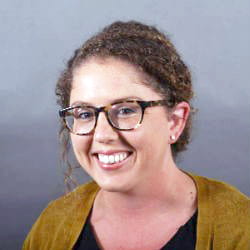Unlike many of her colleagues, Caitlin Coyle, PhD ’14, found the field of gerontology early in her studies. As an undergraduate at The Ohio State University, she assisted a doctoral candidate in health psychology with collecting data that was used both for the candidate’s dissertation but also to develop Coyle’s undergraduate thesis on age differences in coping with heart disease. That experience sparked a passion for research on aging and brought Coyle to UMass Boston. As a gerontology doctoral student, she concentrated her research on social isolation and loneliness in older adults. Her doctoral thesis examined the relationship between social isolation, loneliness, and management of hypertension among community dwelling older adults.
She completed postdoctoral studies at the Yale School of Public Health before returning to UMass Boston as a research fellow with the Center for Social and Demographic Research on Aging (CSDRA), part of the university’s Gerontology Institute. In August 2022 the university named her the center’s director. She succeeded Jan Mutchler, PhD, founding director of CSDRA and now institute director, who hired Coyle to conduct research for the center while earning her doctorate.
“I’ve experienced the paradigm of being considered young but feeling old at heart. Understanding how to maximize the growth and change that comes with age is my life’s work,” says Coyle. “I value the multidisciplinary nature of gerontology, and that my work with CSDRA combines traditional social science with applied community engaged research practices.” CSDRA concentrates its work in four primary areas: economic security (which includes producing the nationally known Elder Index), senior center innovation, social isolation interventions, and developing environments that ensure aging well is accessible to all. Among other projects, the center’s researchers, including graduate and undergraduate assistants, contract with Massachusetts municipalities to assess the demographic composition, needs, and wishes of their older residents. To date, the center has worked with approximately 80 cities and towns from Deerfield to Nantucket.
“We are a public research partner to communities—municipalities, NGOs, and nonprofit organizations. We’re empowering them with information to make decisions about policies and practices that affect Massachusetts residents, all circling the topic of healthy aging at the community level.”
“One of the things I love about the center,” Coyle says, “is that we are both providing information and service to municipalities, who in turn directly impact their residents, but we also have the opportunity to come back to the academy and ask those questions of ourselves, our peers, and our field.” This translational science feedback loop is powerful. “Through our observations and learnings in the community, we experience the very research questions that we should be asking.”
In 2020, Coyle partnered with AARP Massachusetts to convene the Massachusetts Task Force to End Loneliness and Build Community, a statewide coalition of senior center directors, town officials, clergy, and nonprofit representatives. The group’s work became particularly relevant months after its founding as the COVID-19 pandemic brought the issue of social isolation to the public’s consciousness. They’ve held three statewide summits on the topic of social connection and have grown the membership to include representatives from 44 organizations and communities across the Commonwealth.
Coyle loves that her CSDRA work upholds what she cherishes most about the work of the University as an institution committed to the Commonwealth and its citizens’ well-being. Her work directly impacts older adults in Massachusetts and beyond, and the Center’s core missions—student research experience, community service, and academic knowledge—align deeply with her personal values. “I get to do all three of those things in a really balanced way,” she says.
–
Drawn in part from an earlier interview with Caitlin Coyle by Adam Mooney


2 Pingbacks